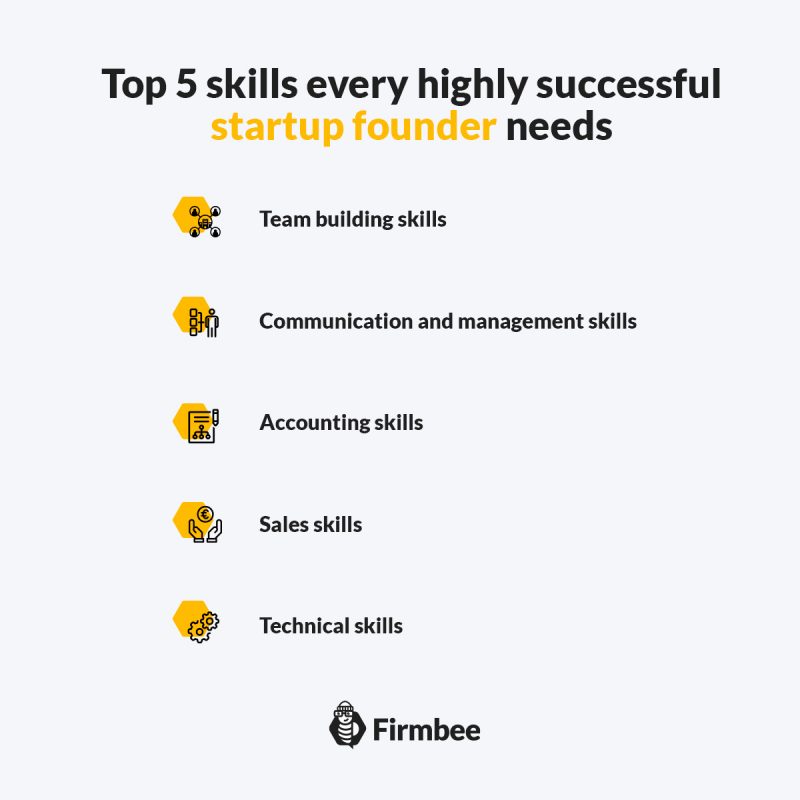It is a huge undertaking to start a new business. No matter how innovative your business idea is, you won’t be able to sucessfully implement it without certain interpersonal skills. Is it enough to be creative and persistent? Here are the five key competencies startup founders need to possess to become highly successful. Read our article and learn more.
Startup founder skills – table of contents:
- Major roles and responsibilities of a startup founder
- Top 5 skills of a successful startup founder
- Summary
Major roles and responsibilities of a startup founder
A startup founder should be able to create a vision of the entire business, secure funds for its development and maintain positive stakeholder relationships. Additionally, if a startup does not have a separate CEO position, the founder’s job will be to manage the whole company and delegate tasks to individual team members.
In order to handle all these duties, startup founders need to possess the right interpersonal skills. Here, we have gathered a list of the most desirable ones.

Top 5 skills of a successful startup founder
Team building skills
A startup can’t be successful without a good team. However, building a high-performing team takes a lot of time and patience. All this means that startup owners should have the ability to choose the right people and take difficult decisions related to employees.
They also need to make sure that all the team members are on the same wavelength and collaborate with each other. They ought to be compassionate, but demanding leaders focused on developing strong relationships.
Communication and management skills
Building communication and management skills has profound benefits to any organization. Effective communicators are able to motivate their teams to perform their tasks faster and more efficiently.
Startup founders who manage their companies must be able to convey clear messages and have the ability to delegate tasks. Being a business owner usually means more than communicating with employees, though. Talking to customers and other key stakeholders is key to the success of the venture.
Accounting skills
Startups face a lot of financial challenges. Losing financial liquidity is one of them. Therefore, business founders must possess fundamental bookkeeping skills so they could obtain external funding and keep track of where their money is.
They should also understand the basic concepts of pricing, revenue modeling and cashflow. Over time, as their business grows, startup owners usually hire specialists to handle all the financial issues.

Sales skills
Startup founders also need to develop some sales skills to ensure continued growth for their businesses. However, rather than selling their products or services in a traditional way, they should focus on marketing the company’s vision and presenting themselves as experts in their fields.
In a startup, selling is not simply sticking customers with a product, but trying to understand their needs and establishing a strong relationship with them.Technical skills
Having basic technical skills is essential for every startup owner. They are especially desirable when the product being designed is immensly complicated.
As the underlying startup idea is to develop a unique solution, business founders can’t simply outsource the whole technical part of the process. Such a method should be avoided at all costs as it might affect the employee motivation and be bad for security reasons.
Top 5 skills of a successful startup founder
We have discussed a few skills that successful business founders should possess, but in fact, many more could be valuable. Strong business leaders must be open minded, persistent in pursuing their goals, and willing to take considerable risks. Startups are, after all, businesses for brave visionaries who want to revolutionize the world.
Managing software teams has never been easier. Check out our new tool for project management.
If you like our content, join our busy bees community on Facebook, Twitter, LinkedIn, Instagram, YouTube, Pinterest.
Author: Andy Nichols
A problem solver with 5 different degrees and endless reserves of motivation. This makes him a perfect Business Owner & Manager. When searching for employees and partners, openness and curiosity of the world are qualities he values the most.
Launch your startup:
- What is a startup?
- Pros and cons of creating a startup
- 8 best industries for startups
- Top 5 skills every highly successful startup founder needs
- How to create a startup? 7 simple and easy steps
- 6 essential startup development stages
- How to create a startup growth strategy?
- General startup statistics you need to know
- Startup vs. corporate job. Which is right for you?
- 5 incredible companies that started in a garage
- How to find a business idea?
- How to check if your startup idea already exists?
- How to name a startup? Useful tips and strategies
- How to gain business knowledge quickly? 5 best practices
- Why do startups fail? 6 startup ideas you should avoid
- 5 weird business ideas that made millions
- Top 6 most profitable small businesses
- 7 questions to determine if your business idea is worth pursuing
- What is a buyer persona? 5 benefits of creating a buyer persona
- How to validate your business idea? 3 easy steps
- Should you follow your passion? The importance of passion in business
- What is market reseach and why is it important?
- Using social media in business
- What to do when you have too many business ideas?
- How to write a good problem statement for your startup?
- How to test your business idea for real?
- How to create a prototype for a product?
- How to build an MVP?
- How to use surveys for testing your business idea?
- 10 useful tools to validate your business idea
- What is a business plan? 4 types of business plans
- What should be included in a business plan?
- What should a product description include?
- Competitor analysis
- Marketing strategy
- Traditional business plan vs. lean startup plan
- Implementation plan. What is it and how to create it?
- Everything you need to know about patents
- Financial management for startups
- What permits and licenses does my startup need?
- What is the average startup founder salary?
- 4 startup taxes you need to pay
- Which legal structure is best for your business?
- Startup costs. How much money will you need?
- Protection of intellectual property in a startup
- Family funding vs. self-funding
- What is a shareholders’ agreement?
- What should a financial section of a business plan include?


















